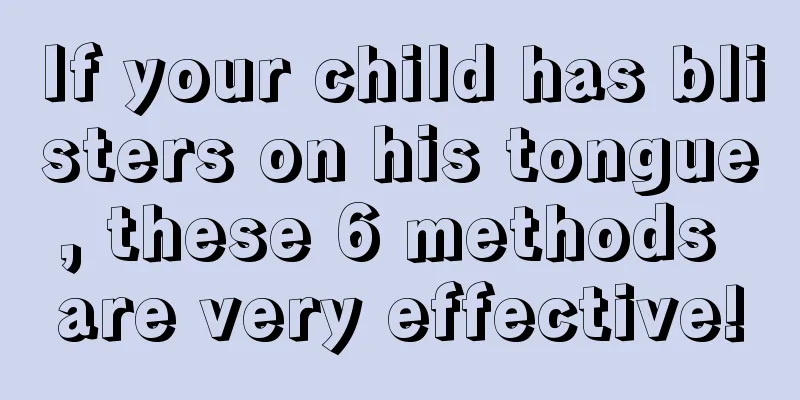Symptoms and treatment of colic in children_Treatment of colic in newborns

|
Because children have relatively low resistance, and they do not pay enough attention to hygiene and care in daily life, they are more prone to certain diseases. For example, childhood colic is a very common disease. When this disease occurs, it has a great impact on the child's body, and people need to pay special attention to it. The following is a detailed introduction to the symptoms and treatments of childhood colic. Symptoms and treatment of colic in children The main symptoms for newborns are violent crying, reluctance to feed, difficulty in coaxing, pale complexion, waving hands, kicking feet, cold extremities, bloated stomach, and tossing and turning. Older children may cry while holding their stomachs or leaning back, and may also have symptoms such as abdominal distension. However, these are all due to intestinal dysfunction or incomplete development of the intestinal nerves, which lead to intestinal contractions and subsequent pain due to abnormal excitement. The main treatment methods include keeping warm, eating small and frequent meals, not swallowing gas, massaging the abdomen clockwise, but not pressing hard, pressing gently to promote the discharge of gas in the intestines, or using suppositories to ventilate and defecate, and applying hot compresses to the abdomen. After each meal and feeding, hold the baby upright and pat the back to induce burping to promote the discharge of gas. Symptoms of colic in babies When a well-nourished and normally growing baby suddenly cries loudly, with a flushed face, pale area around the mouth, clenched fists, bloated abdomen, hard belly, difficulty passing gas, flexed limbs, cold feet, and cannot be relieved by holding, coaxing, or feeding, and the crying continues for 10 minutes to several hours, or has paroxysms, and eventually stops when the baby is exhausted, passes gas, or has a bowel movement, this phenomenon is usually called infant colic. It usually starts in infants aged 2 to 4 weeks, reaches its peak at 4 to 6 weeks, and usually improves on its own by around 4 to 6 months of age. Very few babies stop doing this until they are one year old. How to deal with infant colic 1. Change the holding posture: stand the baby upright on the parents' shoulders, bend the baby's lower limbs, and apply pressure to the baby's stomach, which can relieve the symptoms of colic in some babies. 2. Lay the baby horizontally on your knees, massage the abdomen in a clockwise direction, let the baby drink warm water, apply a warm towel to the abdomen, and apply peppermint oil and other volatile substances on the navel to promote intestinal gas discharge. For babies with colic and severe difficulty in defecation and gas discharge, enema is very effective. 3. Improve the breastfeeding method: empty one breast first when breastfeeding, so that the baby can take in both the lactose-rich foremilk and the fat-rich hindmilk at the same time. This can prevent the baby from having too little enzyme to digest lactose and being unable to process too much lactose at one time. The lactose that cannot be digested and absorbed will ferment and produce gas in the gastrointestinal tract, causing intestinal colic. It is recommended that babies who are allergic to cow's milk protein use hydrolyzed formula milk. 4. You can try belly button stickers, or take some intestinal probiotics orally to adjust the intestines. Do not give your child analgesics or sedatives without authorization. Seek medical attention when necessary, seek guidance or medication from a professional pediatrician, and use simethicone under the guidance of a doctor. |
<<: The child urinates all the time
>>: How to deal with children's separation anxiety
Recommend
What should I do if my seven-year-old child has ADHD?
Nowadays, more and more children are suffering fr...
The reason why newborns struggle and fart
Some parents will struggle hard when they hold th...
What should I do if my child has learning pressure?
If children are under too much pressure from stud...
Is it effective for newborns to get rid of jaundice by sunbathing?
Everyone knows that a newborn baby always brings ...
Is it ok for a newborn to hiccup?
Newborns do not have the ability to speak, so the...
White lips in newborn
Children are the most important members of every ...
What should I do if my child has swollen lymph nodes in the neck?
As a parent, when you find that your child's ...
What should I do if my one-month-old baby has not defecated for three days?
The baby's health is a matter of great concer...
What should I do if my baby has a runny nose due to allergies?
Allergy is a very common skin disease, which is u...
Reasons for newborn baby snoring
People say that sometimes they snore while sleepi...
The child's head tilts to one side, which is torticollis
Some parents always find that their children'...
Is it normal for children not to be like their parents?
In the eyes of many people, many people do not lo...
What are the dangers of lumbar scoliosis in children?
Children's lumbar scoliosis is a relatively s...
What's going on with white spots on my baby's neck?
Some parents observe their children more carefull...
What should I do if my child has a wheezing sound in his throat?
Most parents find that their children have phlegm...









